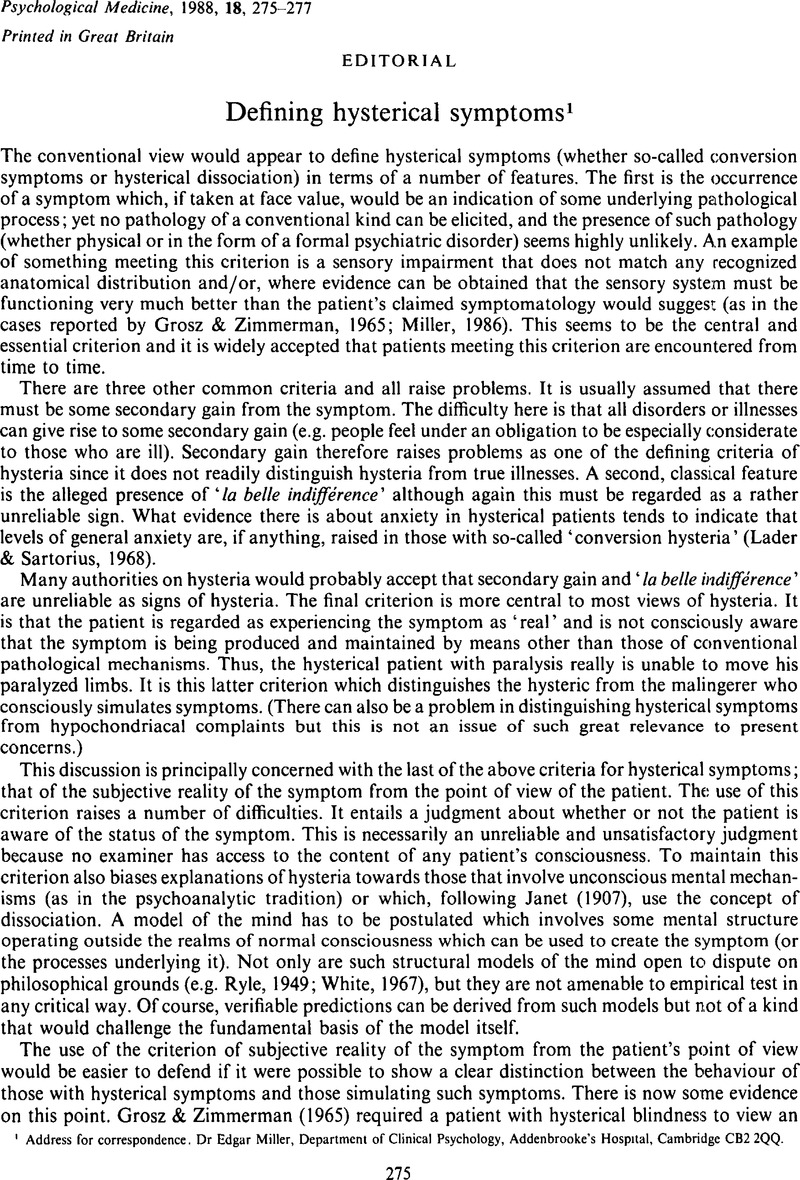Crossref Citations
This article has been cited by the following publications. This list is generated based on data provided by Crossref.
Cook, C. C. H.
1988.
[No Title].
British Journal of Psychiatry,
Vol. 153,
Issue. 5,
p.
700.
STONE, I.H.
1992.
Memory disorder in offenders and victims.
Criminal Behaviour and Mental Health,
Vol. 2,
Issue. 4,
p.
342.
Day, Franklin J.
Merskey, H.
Teasell, Robert W.
and
Shapiro, Allan P.
1995.
Essence, investigation, and management of “neuropathic” pains: Hopes from acknowledgment of chaos.
Muscle & Nerve,
Vol. 18,
Issue. 4,
p.
454.
Fishbain, David A.
Cutler, Robert
Rosomoff, Hubert L.
and
Rosomoff, Renee Steele
1999.
Chronic Pain Disability Exaggeration/Malingering and Submaximal Effort Research.
The Clinical Journal of Pain,
Vol. 15,
Issue. 4,
p.
244.
Kapfhammer, H. P.
2000.
Erlebens- und Verhaltensstörungen, Abhängigkeit und Suizid.
p.
149.
Kapfhammer, H. P.
2001.
Contemporary Psychiatry.
p.
1901.
Kapfhammer, H.-P.
2003.
Psychiatrie und Psychotherapie.
p.
1372.
Shapiro, Allan P.
and
Teasell, Robert W.
2004.
Behavioural interventions in the rehabilitation of acute v. chronic non-organic (conversion/factitious) motor disorders.
British Journal of Psychiatry,
Vol. 185,
Issue. 2,
p.
140.
Kapfhammer, Hans Peter
2004.
Bewegungsstörungen bei Psychischen Erkrankungen.
p.
193.
Rommel, O.
Maercklin, A.
Eichbaum, A.
Kuprian, A.
and
J�ger, G.
2005.
Hemisensorische St�rungen bei neuropathischen Schmerzen im Rahmen chronischer Nervenwurzelreizsyndrome.
Der Schmerz,
Vol. 19,
Issue. 1,
p.
59.
Kozlowska, Kasia
2007.
The Developmental Origins of Conversion Disorders.
Clinical Child Psychology and Psychiatry,
Vol. 12,
Issue. 4,
p.
487.
Kapfhammer, H. -P.
2008.
Psychiatrie und Psychotherapie.
p.
1769.
Kozlowska, Kasia
2009.
Attachment Relationships Shape Pain-Signaling Behavior.
The Journal of Pain,
Vol. 10,
Issue. 10,
p.
1020.
Kanaan, R.
Armstrong, D.
Barnes, P.
and
Wessely, S.
2009.
In the psychiatrist's chair: how neurologists understand conversion disorder.
Brain,
Vol. 132,
Issue. 10,
p.
2889.
Kapfhammer, H.-P.
2011.
Psychiatrie, Psychosomatik, Psychotherapie.
p.
1934.
Enzenauer, Robert
Morris, William
O’Donnell, Thomas
and
Montrey, Jill
2014.
Functional Ophthalmic Disorders.
p.
71.
Caulley, Lisa
Kohlert, Scott
Gandy, Hazen
Olds, Janet
and
Bromwich, Matthew
2018.
When symptoms don't fit: A case series of conversion disorder in the pediatric otolaryngology practice.
Journal of Otolaryngology - Head & Neck Surgery,
Vol. 47,
Issue. 1,



